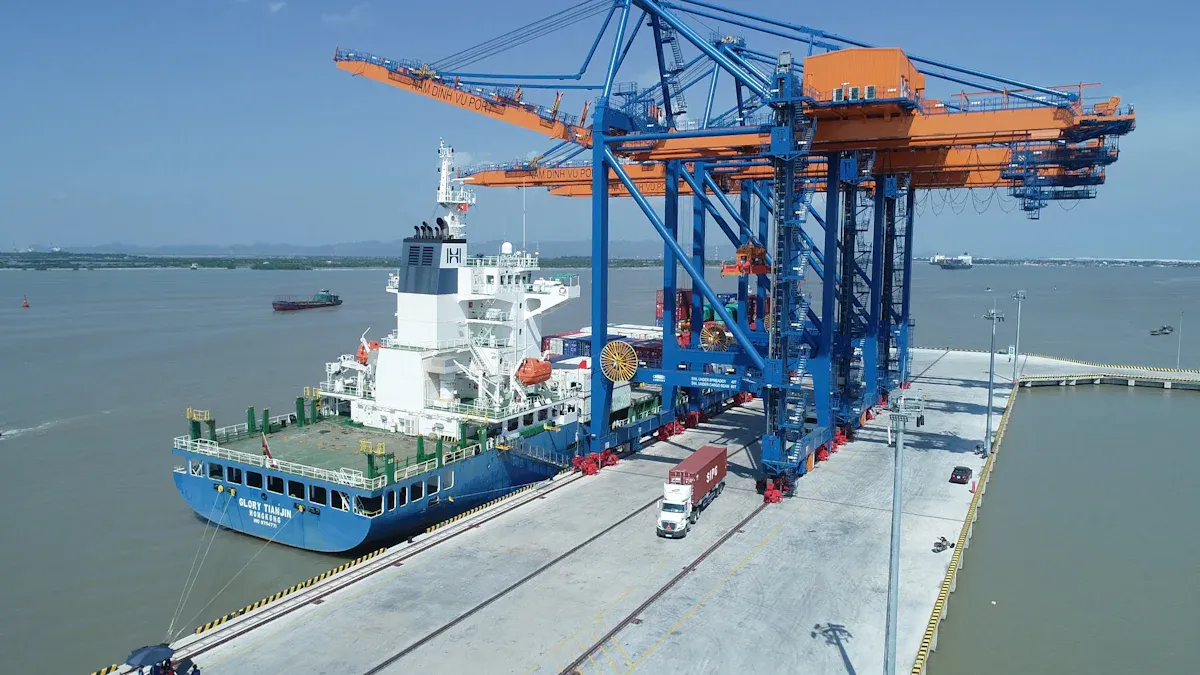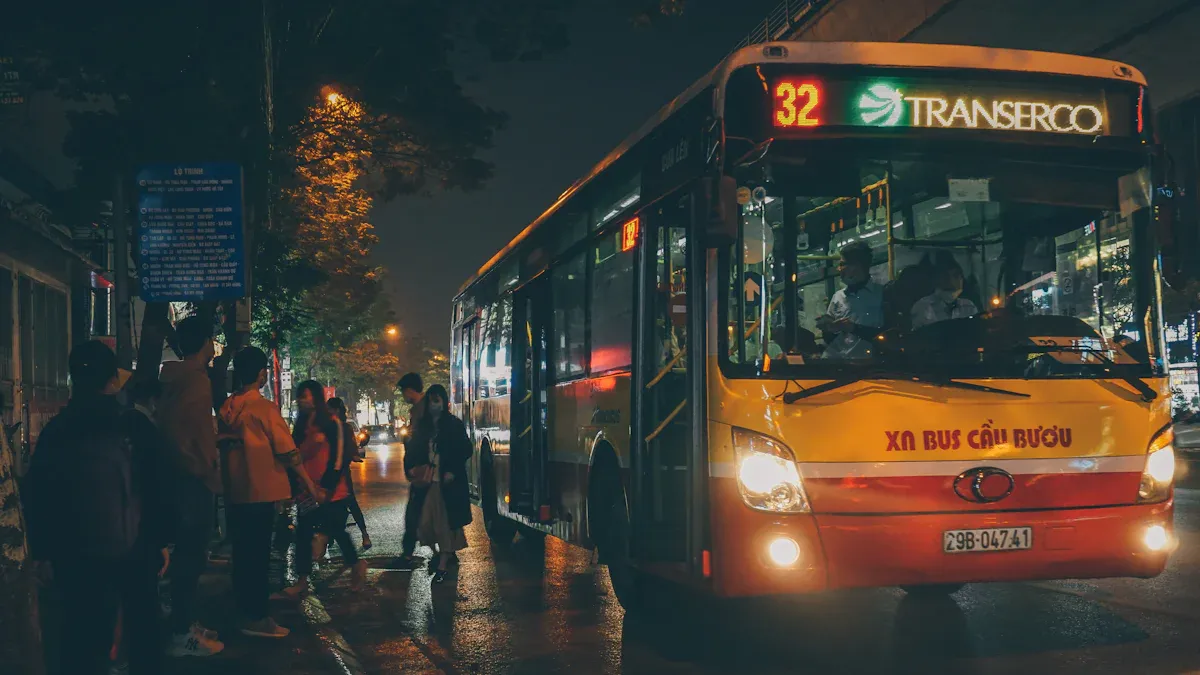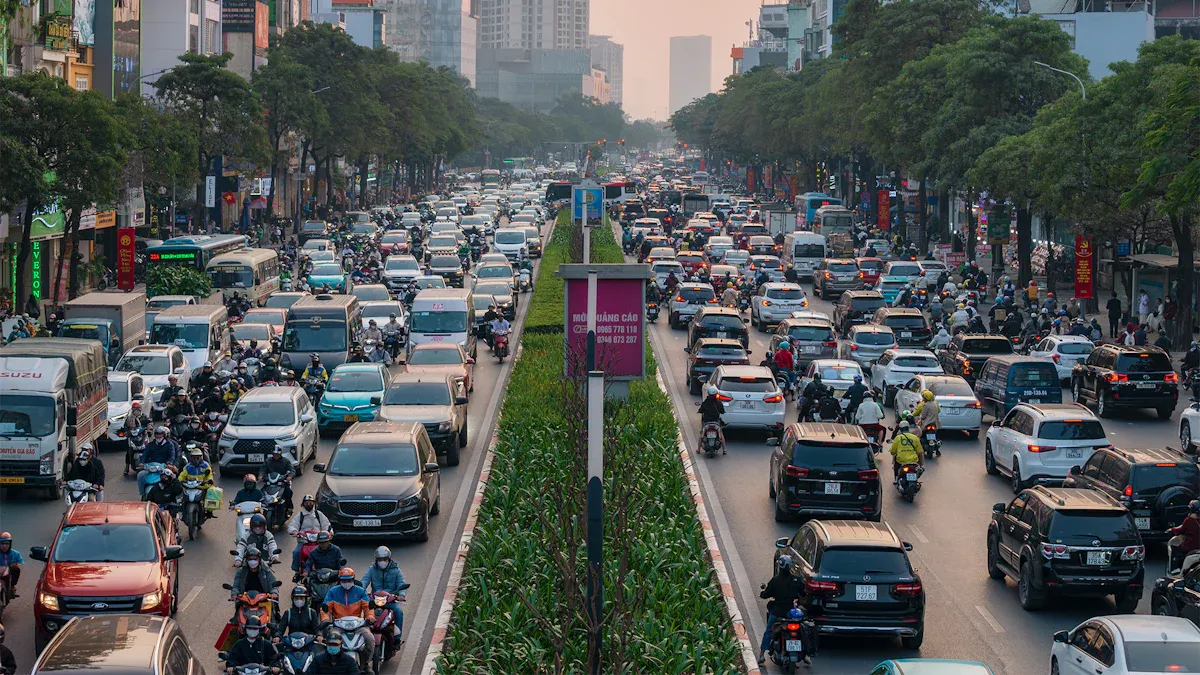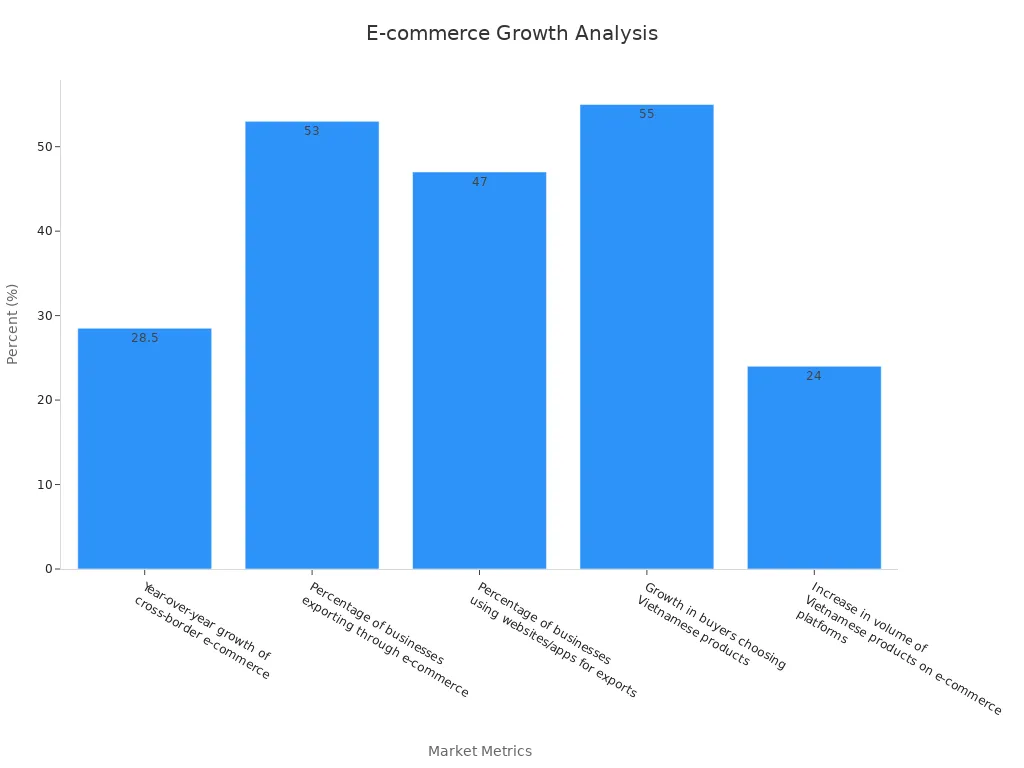Vietnam Transport Logistic: State, Challenges & Future

Vietnam Transport logistics sector drives economic growth and strengthens global trade connections. The country allocates 6% of its GDP to infrastructure, surpassing the regional average. With plans to invest $13.8 billion into expanding seaport systems and achieving a cargo capacity of 1.1-1.4 billion tons by 2030, Vietnam Transport showcases its commitment to logistics excellence. JUSDA and JUSDA Vietnam play pivotal roles in transforming this landscape with innovative supply chain solutions.
Key Takeaways
Vietnam spends 6% of its GDP on building infrastructure to improve logistics and grow the economy.
JUSDA Vietnam is important in logistics, offering smart supply chain ideas and modern storage services.
Using eco-friendly methods and new technology is key for Vietnam's transport logistics to protect the environment and work better.
Current State of Vietnam Transport Logistics

Overview of Vietnam's transport infrastructure
Vietnam's transport infrastructure forms the backbone of its economic growth and trade activities. The country has made significant strides in developing its logistics network, yet challenges remain. Vietnam operates 44 seaports with a combined capacity of 470-500 million tons annually. Major ports such as Hai Phong, Da Nang, Qui Nhon, and Ho Chi Minh City play pivotal roles in facilitating trade. Additionally, the country boasts a total of 320 ports, including smaller facilities.
Despite these advancements, Vietnam's port infrastructure struggles to meet the growing demand for imports and exports. Large-scale investments aim to address this gap, with recent reforms to the national Public-Private Partnership (PPP) framework designed to attract private funding for infrastructure projects. The government has also prioritized highway and aviation developments to accommodate rapid passenger growth.
Vietnam's logistics performance has seen fluctuations in recent years. The Logistics Performance Index (LPI) ranking dropped from 39th in 2021 to 43rd in 2023. However, the transport and storage sector experienced a 17.08% year-on-year growth in 2022, reflecting the sector's resilience and potential. Approximately 7,000 new businesses entered the transport sector that same year, further highlighting its dynamism.
Key economic zones and their connectivity
Vietnam's economic zones benefit from targeted transport infrastructure investments, enhancing connectivity and trade opportunities. The Mekong Delta stands out as a region that has undergone significant transformation. Infrastructure projects in this area have improved accessibility and attracted foreign investments.
Cần Thơ City, a key hub in the Mekong Delta, exemplifies the impact of these developments. New infrastructure has reduced travel time from four hours to two and a half hours, facilitating trade and boosting economic activity. Such improvements underscore the importance of strategic investments in transport infrastructure to strengthen regional connectivity.
Contributions of JUSDA Vietnam to Vietnam's logistics landscape
JUSDA Vietnam has emerged as a vital player in the country's logistics sector. With over 15 years of experience, the company offers comprehensive transportation services, including air freight, sea freight, and trucking. Its Vietnam-China-Europe Railway Express provides efficient land transport solutions, connecting Vietnam to key international markets.
The company operates seven warehouses across Vietnam, covering 110,000 square meters. These facilities feature advanced inventory management systems like eVMI and Juslink, ensuring real-time stock tracking and operational efficiency. JUSDA Vietnam also provides value-added services such as picking, packing, labeling, and clean room sorting, catering to diverse client needs.
JUSDA Vietnam's self-owned customs team ensures smooth clearance processes, while its multilingual capabilities facilitate seamless communication. By leveraging technology and fostering strong relationships with customs authorities, the company has positioned itself as a reliable partner for businesses navigating Vietnam's logistics landscape.

JUSDA Solutions
To provide you with professional solutions and quotations.
Challenges in Vietnam Transport Logistics
Infrastructure gaps and bottlenecks
Vietnam faces significant infrastructure challenges that hinder the efficiency of its transport logistics sector. The disparity in infrastructure quality between major cities like Ho Chi Minh City and Hanoi highlights these gaps. Businesses in Ho Chi Minh City rate infrastructure factors at an average score of 4.60, while Hanoi scores only 3.7. This difference reflects uneven development and bottlenecks in connectivity.
The country’s investment framework is evolving to address these issues, particularly through Public-Private Partnerships (PPPs). Vietnam requires an estimated $500 billion to resolve infrastructure challenges, with $300 billion expected from PPPs. Regulatory changes aim to attract private capital, but delays in project execution and planning inefficiencies remain obstacles. Vietnam's participation in the ASEAN Economic Community and recent trade agreements further emphasize the urgency of infrastructure development.
Environmental concerns and sustainability issues
The transportation sector in Vietnam contributes significantly to environmental degradation. High CO2 emissions from major seaports, including Ben Nghe and Saigon—Hiep Phuoc, exacerbate climate change. Ports heavily reliant on road infrastructure face challenges due to insufficient alternatives, increasing energy consumption and pollution levels.
Aspect | Details |
|---|---|
Environmental Impact | The transportation sector in Vietnam faces significant issues with energy consumption and pollution. |
Specific Findings | High CO2 emissions from Ho Chi Minh City’s seaports contribute to climate change. |
Key Locations | Ports such as Ben Nghe, Saigon—Hiep Phuoc, and Thanh Le are noted for their high emissions. |
Industry Development | The transportation industry is heavily reliant on road infrastructure due to insufficient alternatives. |
Digital Transformation Need | There is a pressing need for digital technology integration in the transportation sector. |
Vietnam must prioritize sustainability by integrating green technologies and adopting digital solutions to reduce emissions. The Environmental Performance Index highlights areas for improvement, including PM2.5 exposure, tree cover loss, and climate change mitigation.
Policy and regulatory limitations
Businesses operating in Vietnam's transport logistics sector face challenges due to evolving regulations. Companies must navigate complex customs procedures and import/export restrictions. Compliance checks and documentation management are essential to avoid penalties and delays.
Businesses face significant challenges due to evolving regulations in logistics.
Companies must stay informed about customs procedures and import/export restrictions.
Compliance checks and documentation management are essential to avoid penalties and delays.
While Vietnam has introduced new frameworks to attract private investment, regulatory inefficiencies often delay infrastructure projects. Anti-corruption measures and updated planning instructions are necessary to enhance efficiency and transparency in development.
Workforce and technological adoption challenges
Vietnam's transport logistics sector struggles with workforce and technological adoption challenges. Although PC adoption rates have increased, automation expectations remain unmet. High manual labor jobs dominate the industry, making it susceptible to automation risks.
Technology Adoption Rate | Workforce Size Change |
|---|---|
No significant change | |
Automation Expectations | No correlation found |
Central Asia Context | High manual labor jobs susceptible to automation |
The sector requires skilled labor and advanced technologies to improve operational efficiency. Digital transformation, including the integration of AI and IoT, can address these challenges. Workforce training programs and investments in technology adoption are critical for Vietnam to remain competitive in the global logistics market.
Future Opportunities in Vietnam Transport Logistics

Government investments in infrastructure development
Vietnam has prioritized infrastructure development to strengthen its logistics capabilities. The government’s transport infrastructure master plan for 2021-2030 allocates $65 billion to projects such as expressways, high-speed railways, and deepwater ports. These initiatives aim to improve connectivity between economic zones and reduce transportation costs. The Long Thanh International Airport project, expected to handle 100 million passengers annually, will enhance Vietnam’s position as a regional logistics hub. Investments in smart infrastructure, including automated port systems and digital traffic management, further demonstrate Vietnam’s commitment to modernizing its transport network.
Trade agreements and their impact on logistics
Vietnam’s participation in trade agreements like the Comprehensive and Progressive Agreement for Trans-Pacific Partnership (CPTPP) and the Regional Comprehensive Economic Partnership (RCEP) has boosted its logistics sector. These agreements reduce tariffs and streamline customs procedures, facilitating smoother trade flows. Vietnam’s strategic location in Southeast Asia positions it as a gateway for regional and global trade. Enhanced trade volumes from these agreements create opportunities for logistics providers to expand their services and improve efficiency.
Transition to green energy and electric mobility
Vietnam is transitioning to green energy and electric mobility to address environmental concerns. The roadmap includes phasing out fossil fuel vehicles by 2050 and promoting electric vehicle (EV) adoption. Participation in the Just Energy Transition Partnership (JETP) supports this shift. The government offers incentives such as free first-time registration fees and reduced excise taxes for EVs. Major manufacturers like KIA and Hyundai plan to enter the Vietnamese market, reflecting growing interest in EVs.
Year | Projected Electric Vehicle Ownership |
|---|---|
2028 | |
2040 | 3.5 million |
These developments highlight Vietnam’s commitment to sustainable transport solutions.
Role of JUSDA Vietnam in advancing sustainable logistics solutions
JUSDA Vietnam plays a crucial role in promoting sustainable logistics. The company integrates green technologies into its operations, such as energy-efficient warehousing and optimized transport routes. Its JusLink platform enhances supply chain visibility, reducing inefficiencies and emissions. JUSDA Vietnam’s expertise in customs clearance and multimodal transport supports businesses in adopting eco-friendly practices. By aligning with Vietnam’s green energy goals, JUSDA Vietnam contributes to a more sustainable logistics ecosystem.
Vietnam's Role in the Global Value Chain
Regional cooperation and trade partnerships
Vietnam plays a pivotal role in regional cooperation, leveraging trade agreements to strengthen its position in the global value chain. The ASEAN Economic Community (AEC) facilitates the free flow of goods and services, enhancing Vietnam's trade capabilities. The Mekong subregion, where Vietnam is a key player, has emerged as a hub for stable supply chains. Collaboration with nations like the Republic of Korea has attracted foreign direct investment and diversified supply chains. These partnerships underscore Vietnam's strategic importance in Southeast Asia's logistics landscape.
Evidence Type | Details |
|---|---|
Infrastructure Upgrades | The North-South Expressway improves transport efficiency, while port expansions increase cargo capacity. |
Trade Agreements | Expanding trade agreements create new opportunities for Vietnam's logistics sector. |
Regional Cooperation (ASEAN) | The ASEAN Economic Community enhances trade by facilitating the free flow of goods and services. |
Positioning Vietnam as a logistics hub in Southeast Asia
Vietnam's strategic location and robust infrastructure investments position it as a logistics hub in Southeast Asia. The North-South Expressway and port expansions enhance connectivity and cargo handling capabilities. Vietnam's participation in regional agreements further solidifies its role as a gateway for trade. These developments align with the country's ambition to become a central player in the global logistics network.
Opportunities in e-commerce and cross-border trade
Vietnam's e-commerce sector is experiencing rapid growth, creating significant opportunities for cross-border trade. The market size reached $20.5 billion in 2023 and is projected to grow to $45 billion by 2025. Cross-border e-commerce grows at 28.5% annually, with 53% of businesses exporting through online platforms. Government initiatives, such as the National E-Commerce Development Plan, support this growth by providing training and solutions for exporting enterprises.

Statistic/Projection | Value |
|---|---|
E-commerce market size in 2023 | $20.5 billion |
Expected market size by 2025 | $45 billion |
Year-over-year growth of cross-border e-commerce | 28.5% |
JUSDA's contributions to global supply chain integration
JUSDA enhances Vietnam's role in the global value chain through innovative supply chain solutions. Its JusLink platform integrates IoT and AI, enabling real-time collaboration and transparency. JUSDA Vietnam's multimodal transport services connect Vietnam to key international markets, supporting businesses in navigating complex global supply chains. By leveraging advanced technologies, JUSDA ensures efficient and sustainable logistics operations, aligning with Vietnam's aspirations to lead in global trade.
Vietnam's transport logistics sector demonstrates immense potential despite existing challenges. Sustainable development and technological innovation remain critical for future growth.
As Vietnam continues its trajectory as a pivotal player in the global supply chain landscape, stakeholders must adapt to emerging trends and capitalize on opportunities for growth and resilience.
JUSDA Vietnam exemplifies excellence by driving innovation and fostering sustainable logistics solutions.
FAQ
What makes Vietnam an attractive logistics hub in Southeast Asia?
Vietnam's strategic location, robust infrastructure investments, and participation in trade agreements position it as a key logistics hub for regional and global trade.
How does JUSDA Vietnam support businesses in navigating Vietnam's logistics landscape?
JUSDA Vietnam offers multimodal transport, advanced warehousing, and real-time inventory systems, ensuring efficient logistics operations and seamless connectivity to international markets.
What role does technology play in Vietnam's transport logistics sector?
Technology enhances operational efficiency through AI, IoT, and digital platforms, enabling real-time tracking, demand forecasting, and sustainable logistics solutions.
See Also
Innovative Logistics Technologies Shaping Our Future Landscape
Navigating Tomorrow's Logistics Through Digital Innovations
Transforming Future Logistics With Artificial Intelligence Solutions
Get Prepared: Discovering New Transport Tech for Supply Chains
